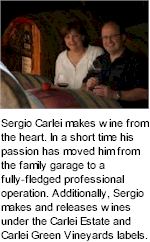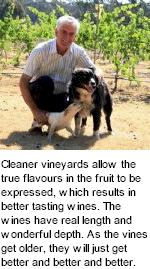About Turners Crossing - the Winery
Turners Crossing
Turner’s Crossing Vineyard is located in Bendigo, a popular ford In the 1800s, used by local farmers to traverse the Loddon River
Today the fertile red soil is home to a 103-acre vineyard, where full-bodied Cabernet Sauvignon, Shiraz and Viognier grapes are produced for a variety of Victorian winemakers as well as the award winning wines bearing the Turner Crossing label. The vineyard is around 10 kms north of both Water Wheel and Pondalowie Vineyards, and 20 kms west of Connor Park. The vines are planted on well-drained red sandy clay loam topsoil and average yield is below 3 tonnes per acre. The subsoil is red light-medium clay, containing limestone pebbles. There is minimal use of chemicals and pesticides are not used at all. Vines are spur pruned and bud numbers are calculated to allow low yields.

For well over a century the ranges of Central Victoria surrounding Bendigo have been home to some of Australia’s greatest wines. This section of the Bendigo GI produces some exceptional wines. The first grapes were planted in the region in 1856, just after the start of the massive gold rush. The gold rush brought tens of thousands of hopeful diggers from around world, many of whom had extensive knowledge of the wines and foods of Europe.
Their knowledge, combined with the exceptional quality of Bendigo fruit, yielded wines of such distinction that the judges at the 1873 Vienna Exhibition were heard to exclaim of Bendigo’s early Hermitage (Shiraz) that no Colonial wine can be that good! The tradition of great wines in Bendigo continues, as evidenced by the accolades in the press and the numerous awards at wine shows throughout Australia. Turner’s Crossing wines are now found across Australia and are exported around the world.
Turner’s Crossing is the realisation of a dream for grape grower Paul Jenkins, who spent many years honing his craft on a small vineyard at Yankee Creek (a few kilometres south-east of Bendigo) before planting the Turner’s Vineyard just west of Serpentine. When winemaker Sergio Carlei of Carlei Estate initially purchased fruit for his green vineyard label, he was so impressed with the results he immediately struck up a business partnership with Paul to release the Turner’s Crossing wines under their own label. The wines received immediate success with the 2002 Cabernet Sauvignon (also bottled under the Green Vineyard label) receiving a blue gold at the Sydney International Wine Show.

Sergio Carlei makes wine from the heart. In a short time his passion has moved him from the family garage to a fully-fledged professional operation producing over 10,000 cases of wine per year from his winery at Upper Beaconsfield in Victoria. Sergio and esteemed grower Paul Jenkins have combined their respective talents to craft the line of Turners Crossing wines. Additionally, Sergio makes and releases wines under the Carlei Estate and Carlei Green Vineyards labels.
Carlei lives in a mud-brick house he built next to the winery. The property includes a modest biodynamic vineyard that was established in 1997. Carlei’s philosophy is to make real wines, wines that are subtle, intense and best enjoyed with food. Wines with personality. Sergio believes environmentally responsible viticulture is the best course for winemaking. He is committed to sustainable agricultural procedures and natural winemaking practices. His ultimate goal is to have all of the vineyards organically certified or using organic practices. In winemaking as in viticulture, Sergio's mission is to improve wine quality and optimize fruit flavors naturally. Invariably, these wines are made with minimal interference employing traditional winemaking skills. This includes careful manipulation of the fruit using a multi-dimensional approach with the fermentation, natural yeasts and whole bunch basket pressing. In most cases the wines are unfiltered or fined. The results of these very natural processes are wines of quality and complexity.
Sergio believes that soil to a vine is like blood to a human being. Toxic soil means improper vine health. Toxins in the blood lead to all sorts of health problems in people. Cleaner vineyards allow the true flavours in the fruit to be expressed, which results in better tasting wines. The wines have real length and wonderful depth. As the vines get older, they will just get better and better.
